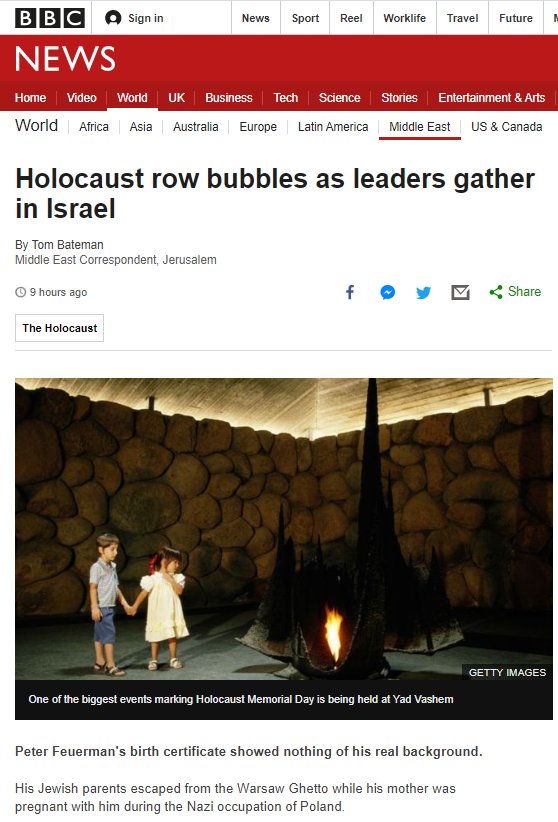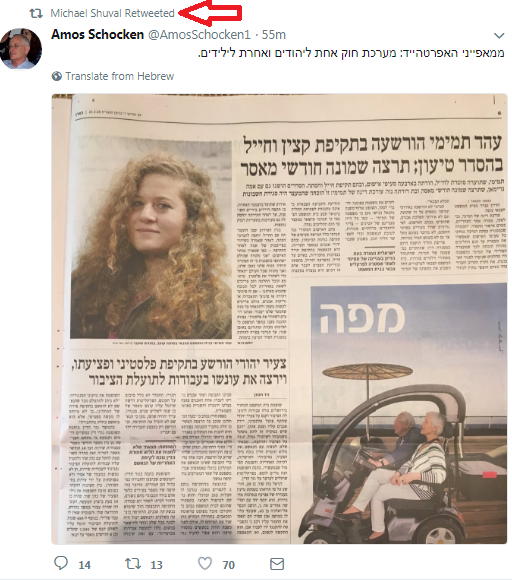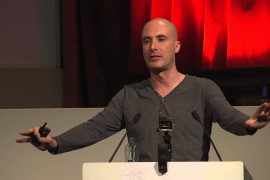January 22nd saw the appearance of an article titled ‘Holocaust row bubbles as leaders gather in Israel’ in the ‘Features’ section of the BBC News website’s ‘Middle East’ page.
Written by the BBC Jerusalem bureau’s Tom Bateman, the article’s main theme is what he describes as “a row about the distortion of history by rival nationalist leaders in Europe”.
Referring to the Polish president, Bateman tells readers that:
“Mr Duda has said he will not attend this week’s Holocaust remembrance ceremony at Yad Vashem, the official memorial centre in Jerusalem. […]
Mr Duda complained that he has not been allowed to address the audience, whereas Mr Putin and other leaders will speak.”
He goes on to claim that what he again describes as “the row” over speaking arrangements at the Jerusalem event “has aggravated a bitter dispute between Russia and Poland – whose leaders have been armflexing over the war’s legacy”.
Bateman gives an overview of that Russian and Polish “armflexing” – which of course has been going on independently of the Jerusalem conference and which, as the BBC has itself reported, has its roots in a European Parliament resolution dating from last September.
He then moves on to the topic of the Polish legislation of 2018:
“Two years ago the Polish government made it illegal to say that the country was complicit in Nazi crimes during the Holocaust.
After an international outcry it later deleted parts of the law, but the controversy then engulfed Israel’s Prime Minister Benjamin Netanyahu.
He supported the partial u-turn by signing a joint statement with the Polish prime minister.
That move was condemned by Yad Vashem who said the statement contained “grave errors and deceptions” and harmed the “historical memory of the Holocaust”.
Mr Netanyahu defended his move saying he had consulted Yad Vashem’s chief historian.”
Bateman’s literal ‘bottom line’ to a story ostensibly about Russian and Polish polemics relating to World War Two and the Holocaust comes in a section sub-headed ‘Betrayal of the Holocaust’. There he manages to reframe the story by uncritically quoting a contributor whose highly relevant political opinions are not revealed to BBC audiences – in clear breach of BBC editorial guidelines relating to “Contributors’ Affiliations”.
“But among his [Netanyahu’s] critics was the Israeli historian Prof Zeev Sternhell, a Jewish survivor of the Holocaust in Poland who escaped the Warsaw Ghetto as a child with the help of two Polish families.
He accuses Mr Netanyahu of embracing ultra-nationalists in Europe because they provide a counterweight to the EU’s “liberal wing” of France and Germany who are critical of Israel’s occupation of the Palestinian Territories.
“In order to get that alliance working he’s ready to pay a heavy price… And the heavy price is a betrayal of the Holocaust,” he says.” [emphasis added]
Significantly, Bateman did not bother to remind readers of more recent events which can hardly be described as “embracing” the Polish stance.
Neither did he offer readers any contrasting view to the predictably controversial claim from Professor Sternhell that Israel’s prime minister is ‘betraying’ the Holocaust in order to counter criticism of “Israel’s occupation” and apparently neither did he offer the right of reply to that allegation.
Related Articles:
BBC News turns media blunder into story about Israeli PM’s ‘comment’
BBC News website omits key information in Polish Holocaust law report




